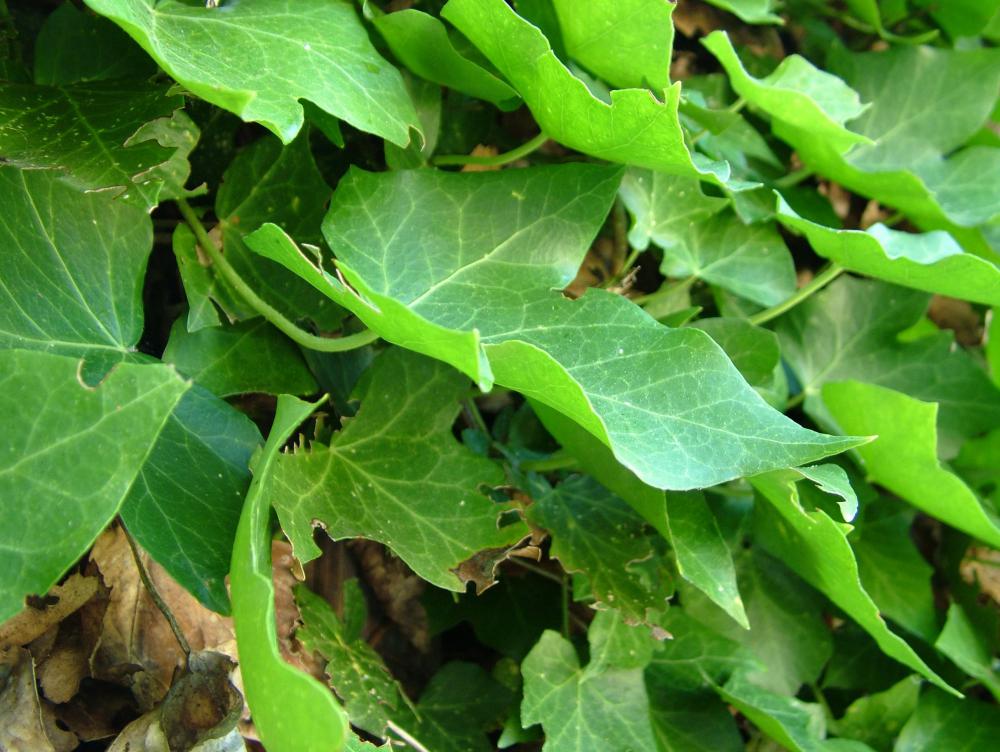At HomeQuestionsAnswered, we're committed to delivering accurate, trustworthy information. Our expert-authored content is rigorously fact-checked and sourced from credible authorities. Discover how we uphold the highest standards in providing you with reliable knowledge.
What is an Algerian Ivy?
Algerian ivy (Hedera canariensis) is an evergreen climbing plant native to the Canary Islands, North Africa, the Azores, and Portugal. Also known as Canary Island ivy, it grows rapidly and produces large, glossy, dark-green leaves. Although closely related to the more popular English ivy ( Hedera helix), the two plants have a few distinct differences. Algerian ivy has red leaf stems and larger, shinier leaves with five to seven lobes, and it grows more quickly under optimal conditions.
This plant is widely cultivated in tropical and subtropical areas around the world. Gardeners in warm climates value the hardy vine for its attractive foliage and ease of care in the home garden. The plant is commonly used as a ground cover, where its thick leaves provide interest underneath large trees, and add uniformity to the landscape. It is also used to hide the spent foliage of spring-flowering bulbs, or to cover walls, trellises, and fences. In cooler climates, gardeners grow the plant indoors in hanging baskets or decorative containers.

Like other types of ivy, the vine is adaptable to most soil types. It performs best when grown in moist, rich soil, however, and does not require any particular soil pH level. The plant tolerates partial to full shade, and it may wither if planted in an area that receives direct sunlight for most of the day. Shady areas under trees or large garden plants make the best home for Algerian ivy. The plant is also tolerant of salt, which makes it a useful planting for areas near bodies of salt water.

Because of its tropical origins, Algerian ivy may sustain permanent damage at temperatures below 20°F (about -6.67°C). Some variegated types may be damaged at even warmer temperatures. In general, green-leaved varieties tolerate colder temperatures than those with variegated leaves, but specific cold tolerance depends on the variety.
The ivy's rapid growth makes it invasive without proper care. Regular pruning to keep the vine within bounds will be necessary. If left unattended, the plant will take over a yard or garden, and may even damage nearby buildings if allowed to grow up their sides.

Although generally not damaged by disease, Algerian ivy may develop leaf spot if grown in an area with little air circulation. Leaf spot causes round blemishes to appear on the plant's leaves, as a result of the growth of bacteria or parasitic fungi. Other problems include snails, scale, and sooty mold, although the plant's long-term health is typically not affected by these pests. Proper care, including light fertilization during the growing season and providing adequate moisture without over-watering, should prevent most pests and diseases.
AS FEATURED ON:
AS FEATURED ON:














Discussion Comments
If you are killing poison ivy then you shouldn't use the same method as you use for removing Algerian ivy. Because of the allergy causing oils in poison ivy, you don't want to cut the plants and release the oils. Try to dig up the root. If this is not possible then use shears and make one cut as close to the root as possible. Never mow poison ivy.
When you dispose of the cut plant put it in a garbage bag. Do not burn it because this will release the oils.
@Feryll - If you have Algerian ivy then the way you remove it will depend on where it is growing. If the plant is growing on a tree or wall then you want to cut it down with garden tools and remove the vines. Then you should get a spade and dig out as much of the root as possible.
Getting the entire plant can be difficult, so plan to keep an eye on the plant and cut it back whenever you see new growth. Also you can spray a herbicide on the roots. Eventually, the plant should die from the continual cutting.
When ivy is growing along the ground, a close cutting with the mower and an application of herbicide is the best way to get rid of it. This may take a little while to work, too, but if you are persistent the ivy will die.
The people who lived in my girlfriend's house before she bought it really liked outdoor plants. The yard is filled with flowers, trees and bushes of all kinds. There is no set pattern to how they were planted either, so there is stuff growing everywhere and we don't even know what all of it is.
The house was vacant for a couple years and during that time, no one was keeping up the yard, so some of the plants have grown out of control. If you have any experience with ivy then you know how quickly it can take over a yard, and we have several type of the plant, including poison ivy. I have been trying to figure out what some of the other types of ivy are. It's difficult to tell one from the other.
What's the best way to control ivy in general? Some of it we want to keep, but we want to eliminate most of it, and make sure it doesn't keep coming back.
Post your comments